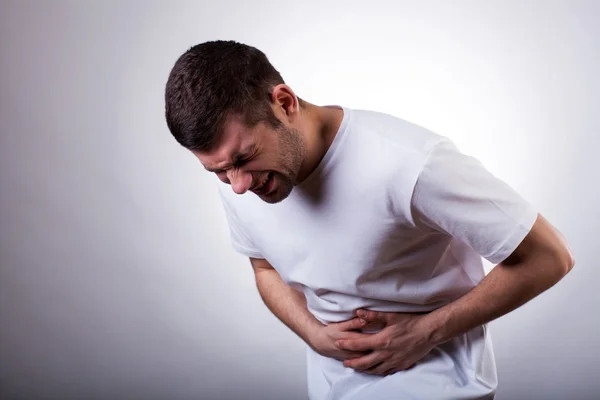Definisi
Proktitis adalah peradangan pada rektum. Rektum termasuk ke dalam saluran cerna bagian bawah, merupakan bagian dari ujung usus besar yang terhubung ke anus atau dubur. Kotoran melewati rektum saat keluar dari tubuh. Proktitis dapat menimbulkan gejala diare, rasa nyeri pada dubur, pendarahan atau keluar cairan dari anus, serta perasaan ingin buang air besar (BAB) terus-menerus. Gejala proktitis bisa berlangsung sebentar atau bisa menjadi kronis (jangka panjang).
Proktitis sering terjadi pada orang yang memiliki penyakit radang usus seperti penyakit Crohn atau kolitis ulserativa. Infeksi menular seksual (IMS) merupakan penyebab lain dari proktitis yang sering terjadi. Proktitis juga bisa menjadi efek samping dari terapi radiasi untuk kanker tertentu.
Penyebab
Beberapa penyakit dan kondisi dapat menyebabkan peradangan pada lapisan dubur antara lain:
- Penyakit radang usus, ditemukan sekitar 30% orang dengan penyakit radang usus yang turut mengalami proktitis
- Infeksi, khususnya infeksi menular seksual dapat menyebabkan proktitis. IMS seperti gonore atau kencing nanah, dan herpes genital terutama ditularkan oleh orang-orang yang melakukan hubungan seks anal. Infeksi yang penularannya melalui makanan, seperti infeksi bakteri Salmonella, Shigella dan Campylobacter, juga dapat menyebabkan proktitis.
- Terapi radiasi untuk kanker yang diarahkan ke rektum atau area sekitarnya, seperti prostat, dapat menyebabkan peradangan rektum. Proktitis karena radiasi bisa terjadi selama rangkaian terapi dan berlangsung hingga beberapa bulan setelah terapi. Atau bisa terjadi bertahun-tahun setelah terapi
- Antibiotik yang terkadang digunakan untuk mengobati infeksi dapat membunuh bakteri baik di usus, sehingga memungkinkan bakteri Clostridium difficile yang berbahaya untuk tumbuh di rektum.
- Proktitis karena pengalihan saluran kotoran atau yang menjalani beberapa jenis operasi usus besar, seperti pengalihan saluran pembuangan tinja dari rektum ke lubang baru yang dibuat melalui pembedahan (stoma).
- Proktitis yang dipicu oleh protein makanan, bisa terjadi pada bayi yang minum susu sapi atau susu formula berbahan kedelai. Bayi yang disusui oleh ibu yang mengkonsumsi produk susu juga dapat mengalami proktitis.
- Proktitis eosinofilik, ketika eosinofil yang merupakan salah satu jenis darah putih menumpuk di lapisan rektum. Proktitis eosinofilik biasanya menyerang anak-anak di bawah 2 tahun.
Faktor Risiko
Faktor risiko terjadinya proktitis meliputi:
- Seks yang tidak aman. Perilaku yang meningkatkan risiko IMS dapat meningkatkan risiko proktitis pula. Risiko tertular IMS meningkat jika memiliki banyak pasangan seks, tidak menggunakan kondom, dan berhubungan seks dengan pasangan yang memiliki IMS.
- Penyakit radang usus. Memiliki penyakit radang usus seperti penyakit Crohn atau kolitis ulserativa akan meningkatkan risiko proktitis.
- Terapi radiasi untuk kanker. Terapi radiasi yang diarahkan pada rektum atau area sekitar rektum, seperti untuk kanker dubur, ovarium, atau prostat, akan meningkatkan risiko proktitis.
Gejala
Tanda dan gejala proktitis antara lain:
- Perasaan ingin BAB terus-menerus
- Pendarahan rektum
- Keluarnya lendir melalui rektum
- Nyeri pada dubur atau pada sisi kiri bawah perut
- Perasaan penuh di sekitar rektum
- Diare
- Nyeri saat BAB
Diagnosis
Dokter akan bertanya mengenai keluhan dan riwayat kesehatan pasien. Setelah pasien menyampaikan segala keluhan yang dialaminya, dokter akan melakukan pemeriksaan fisik. Bila dokter merasa perlu atau ada indikasi untuk dilakukannya pemeriksaan lain, dokter akan menyarankan pasien untuk melakukan pemeriksaan penunjang sebagai upaya dalam menegakkan diagnosis proktitis. Pemeriksaan dan prosedur yang digunakan untuk menunjang diagnosa proktitis meliputi:
- Pemeriksaan darah, dapat mendeteksi adanya infeksi atau kehilangan darah
- Pemeriksaa tinja, dapat membantu menentukan apakah proktitis disebabkan oleh infeksi bakteri atau bukan
- Pemeriksaan pencitraan area sigmoid atau area pangkal usus besar, yang dilakukan melalui prosedur sigmoidoskopi. Dokter menggunakan alat berbentuk pipa ramping, fleksibel, dan berlampu untuk memeriksa sigmoid dan rektum. Saat pemeriksaan, dokter dapat mengambil sampel kecil jaringan (biopsi) untuk dianalisis di laboratorium
- Pemeriksaan pencitraan seluruh area usus besar yang dilakukan melalui prosedur kolonoskopi. Dengan menggunakan pipa teropong seperti pada sigmoidoskopi, dokter memeriksa seluruh dinding usus besar dan juga dapat melakukan biopsi selama pemeriksaan berlangsung
- Pemeriksaan IMS, merupakan serangkaian tes yang dilakukan dengan mengambil sampel urine, darah, atau swab yang diambil dari alat kelamin
Tata Laksana
Pengobatan proktitis tergantung pada penyebab peradangan yang mendasarinya, seperti infeksi, peradangan, atau akibat terapi lain yang sedang dijalani untuk penyakit pasien.
-
Pengobatan proktitis yang disebabkan oleh infeksi
Dokter dapat merekomendasikan obat-obatan untuk mengatasi infeksi Anda. Obat-obatan tersebut antara lain:
-
- Antibiotik pada proktitis yang disebabkan oleh infeksi bakteri. Antibiotik harus dengan resep dokter.
- Antivirus pada proktitis yang disebabkan oleh infeksi virus, seperti herpes yang menular melalui hubungan seksual. Obat ini juga harus dengan resep dokter.
-
Pengobatan untuk proktitis yang disebabkan oleh terapi radiasi
Proktitis karena radiasi yang bersifat ringan biasanya belum memerlukan terapi. Pada kasus lain, proktitis radiasi dapat menyebabkan nyeri berat dan pendarahan yang memerlukan penanganan. Dokter dapat merekomendasikan penanganan seperti:
-
- Obat-obatan yang bisa diberikan dalam bentuk pil, suppositoria (obat yang dimasukan melalui dubur), atau enema (memasukan cairan ke usus besar melalui anus). Obat-obatan ini dapat mengontrol peradangan dan mengurangi pendarahan.
- Pelunak feses yang bertujuan untuk mengatasi penyumbatan di usus.
- Ablasi atau prosedur menghancurkan jaringan yang rusak. Tindakan ini mengatasi gejala proktitis dengan menghancurkan jaringan abnormal yang berdarah. Ablasi meliputi terapi koagulasi plasma argon, krioablasi, elektrokoagulasi, dan terapi lainnya.
Proktitis yang disebabkan oleh penyakit radang usus
Pengobatan proktitis yang terkait dengan penyakit Crohn atau kolitis ulserativa ditujukan untuk mengurangi peradangan pada rektum. Pengobatan meliputi:
-
- Obat anti peradangan untuk mengontrol peradangan dubur. Peradangan yang terjadi pada penyakit penyebab seperti penyakit Crohn sering memerlukan obat penekan sistem imun.
- Operasi yang baru dilakukan bila obat belum bisa mengatasi keluhan, dokter akan merekomendasikan prosedur ini untuk mengangkat bagian rektum yang rusak.
Komplikasi
Proktitis yang tidak diobati atau tidak merespon terhadap pengobatan dapat menyebabkan komplikasi, seperti:
- Anemia yang dapat terjadi sebagai efek perdarahan rektum yang kronis. Pada anemia, Anda tidak memiliki cukup sel darah merah untuk membawa oksigen ke jaringan tubuh. Anemia menimbulkan keluhan lelah, pusing, sesak napas, sakit kepala, kulit pucat, dan mudah marah.
- Ulkus atau luka terbuka yang terjadi karena peradangan kronis pada rektum, bisa muncul di lapisan dalam rektum.
- Fistula atau saluran abnormal antara dua organ yang seharusnya tidak berhubungan yang muncul bila terdapat perluasan ulkus di dinding usus. Fistula dapat terbentuk antara usus dengan kulit atau antara usus dengan organ lain seperti kandung kemih dan vagina.
Pencegahan
Pencegahan yang dapat dilakukan untuk mengurangi risiko proktitis adalah dengan melakukan langkah pencegahan IMS. Cara paling pasti untuk mencegah IMS adalah tidak melakukan hubungan seksual yang berisiko mengalami perlukaan, terutama seks anal. Jika Anda memilih untuk berhubungan seksual, kurangi risiko IMS dengan:
- Tidak berganti-ganti pasangan seks
- Menggunakan kondom setiap kontak seksual
- Tidak berhubungan seks dengan siapa pun yang memiliki luka atau cairan abnormal di area genital
- Jika Anda didiagnosa dengan IMS, berhenti berhubungan seks sampai Anda sembuh terlebih dahulu
- Tanyakan pada dokter bila kondisi Anda sudah aman untuk berhubungan seks lagi
Kapan Harus ke Dokter?
Konsultasi dengan dokter jika Anda memiliki tanda atau gejala proktitis seperti yang disebutkan di atas. Pengobatan yg tepat dan segera akan mengurangi risiko timbulnya terjadi komplikasi.
Mau tahu informasi seputar penyakit lainnya? Cek di sini, ya!
- dr Hanifa Rahma
Proctitis (2020). Retrieved 3 January 2022, from https://www.mayoclinic.org/diseases-conditions/proctitis/symptoms-causes/syc-20376933.
Roth, E. (2018). What is proctitis. Retrieved 9 January 2022, from https://www.healthline.com/health/proctitis.
Proctitis (2020). Retrieved 9 January 2022, from, https://www.webmd.com/digestive-disorders/what-is-rectal-prolapse.
Proctitis (2021). Retrieved 9 January 2022, from https://my.clevelandclinic.org/health/diseases/5964-proctitis.










